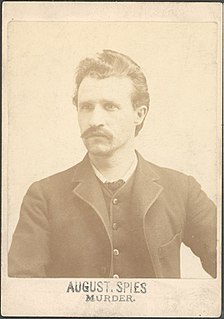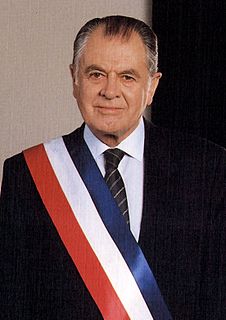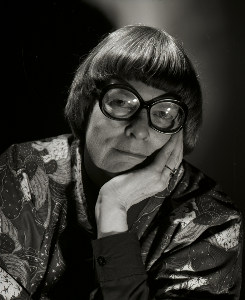A Quote by August Spies
You may pronounce the sentence upon me, honourable judge, but let the world know that in A.D. 1886, in the State of Illinois, eight men were sentenced to death because they believed in a better future; because they had not lost their faith in the ultimate victory of liberty and justice!
Related Quotes
In our country, [habeas corpus ] means that if you've been sentenced and convicted in a state court, either to death or to some other kind of sentence, you have the right to petition a federal court to review what happened to you. And until [Bill] Clinton, you had three, four, five, even more years I collect records of people who have been on death row for eight, 10, 12, 14 years - this is before Clinton - who finally got a decent lawyer, usually a pro bono lawyer, and an investigator, and were able to find out - they - they're but approved that they're - that they were innocent.
Jack believed in something—he believed in white witches and sleighs pulled by wolves, and in the world the trees obscured. He believed that there were better things in the woods. He believed in palaces of ice and hearts to match. Hazel had, too. Hazel had believed in woodsmen and magic shoes and swanskins and the easy magic of a compass. She had believed that because someone needing saving they were savable. She had believed in these things, but not anymore. And this is why she had to rescue Jack, even though he might not hear what she had to tell him.
If an agency is the ultimate judge in every case of conflict, then it is also judge in all conflicts involving itself. Consequently, instead of merely preventing and resolving conflict, a monopolist of ultimate decision making will also cause and provoke conflict in order to settle it to his own advantage. That is, if one can only appeal to the state for justice, justice will be perverted in the favor of the state, constitutions and supreme courts notwithstanding.
Drizzt Do'Urden had followed a line of precepts based upon discipline and ultimate optimism. He fought for a better world because he believed that a better world could and would be made. He had never held any illusions that he would change the world, of course, or even a substantial portion of it, but he always held strongly that fighting to better just his own little pocket of the world was a worthwhile cause.
One of the greatest disasters that happened to modern civilization was for democracy to inscribe "liberty" on its banners instead of "justice." Because "liberty" was considered the ideal it was not long until some men interpreted it as meaning "freedom from justice"; then when religion and decent government attempted to bring them back to justice, organized into "freedom groups" they protested that their constitutional and natural rights were being violated.
The world is full of people who have lost faith: politicians who have lost faith in politics, social workers who have lost faith in social work, schoolteachers who have lost faith in teaching and, for all I know, policemen who have lost faith in policing and poets who have lost faith in poetry. It's a condition of faith that it gets lost from time to time, or at least mislaid.
Those who won our independence believed that the final end of the state was to make men free to develop their faculties... They valued liberty both as an end and as a means. They believed liberty to be the secret of happiness and courage to be the secret of liberty... that public discussion is a political duty; and that this should be a fundamental principle of the American government.
The liberty I mean is social freedom. It is that state of things in which liberty is secured by the equality of restraint. A constitution of things in which the liberty of no one man, and no body of men, and no number of men, can find means to trespass on the liberty of any person, or any description of persons, in the society. This kind of liberty is, indeed, but another name for justice.
In most ages many countries have had part of their inhabitants in a state of slavery; yet it may be doubted whether slavery can ever be supposed the natural condition of man. It is impossible not to conceive that men in their original state were equal; and very difficult to imagine how one would be subjected to another but by violent compulsion. An individual may, indeed, forfeit his liberty by a crime; but he cannot by that crime forfeit the liberty of his children.
...ordinary men and women may often feel unmotivated to exert their citizenship, either because they cannot tell the difference between the different alternatives, or because they have lost faith in the political classes, or because they feel that the really important issues are not in their power to decide.
It's not the length but the quality of life that matters to me. It has always been important to me to write one sentence at a time, to live every day as if it were my last and judge it in those terms, often badly, not because it lacked grand gesture or grand passion but because it failed in the daily virtues of self-discipline, kindness, and laughter. It is love, very ordinary, human love, and not fear, which is the good teacher and the wisest judge.
The Constitutional framers were peace men; but they preferred revolution to peaceful submission to bondage. They were quiet men; but they did not shrink from agitating against oppression. They showed forbearance; but that they knew its limits. They believed in order; but not in the order of tyranny. With them, nothing was "settled" that was not right. With them, justice, liberty and humanity were "final;" not slavery and oppression.

































